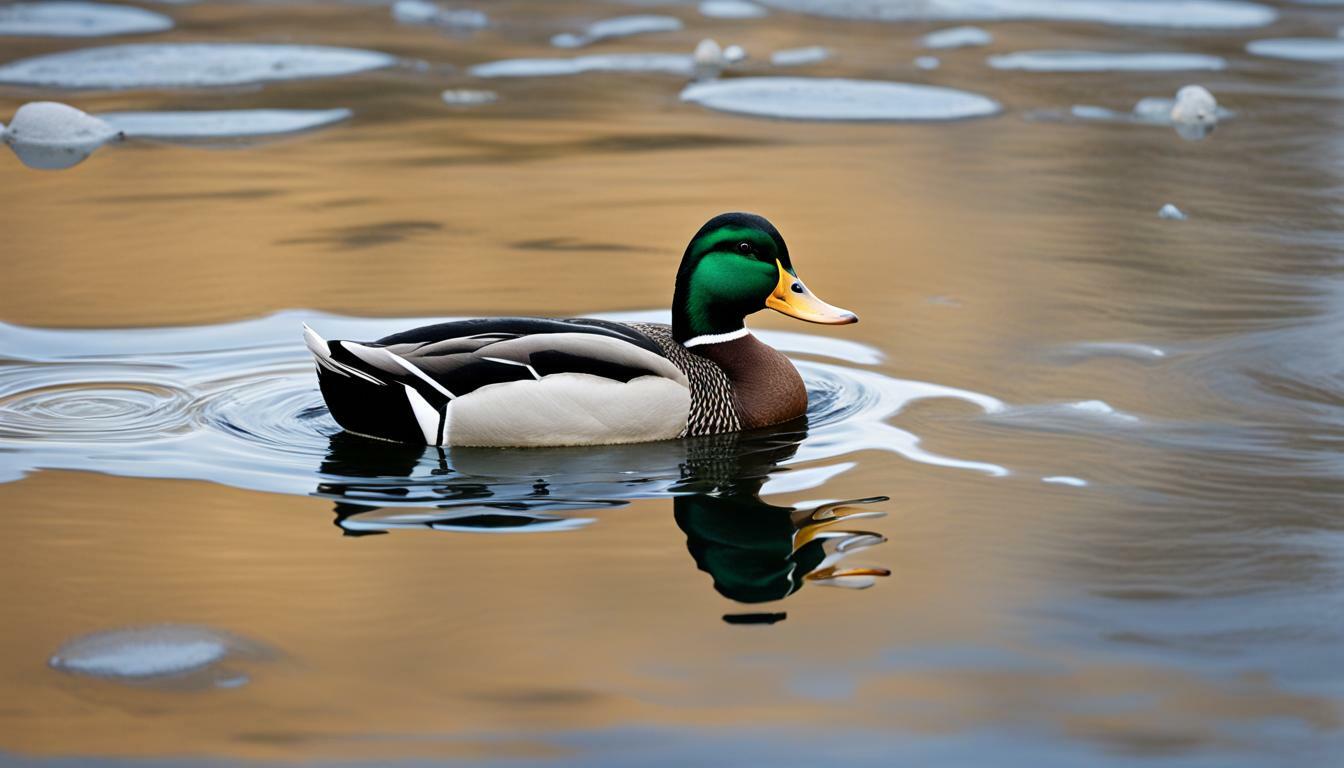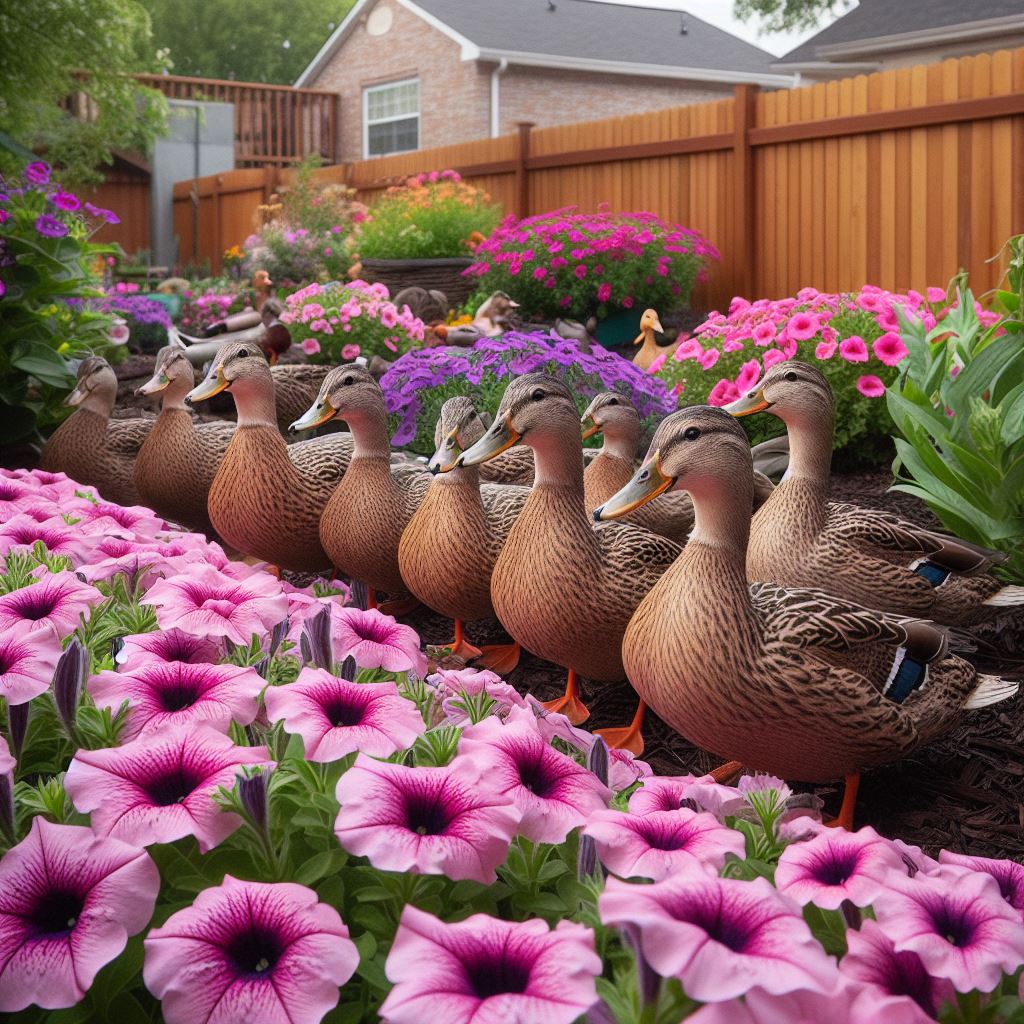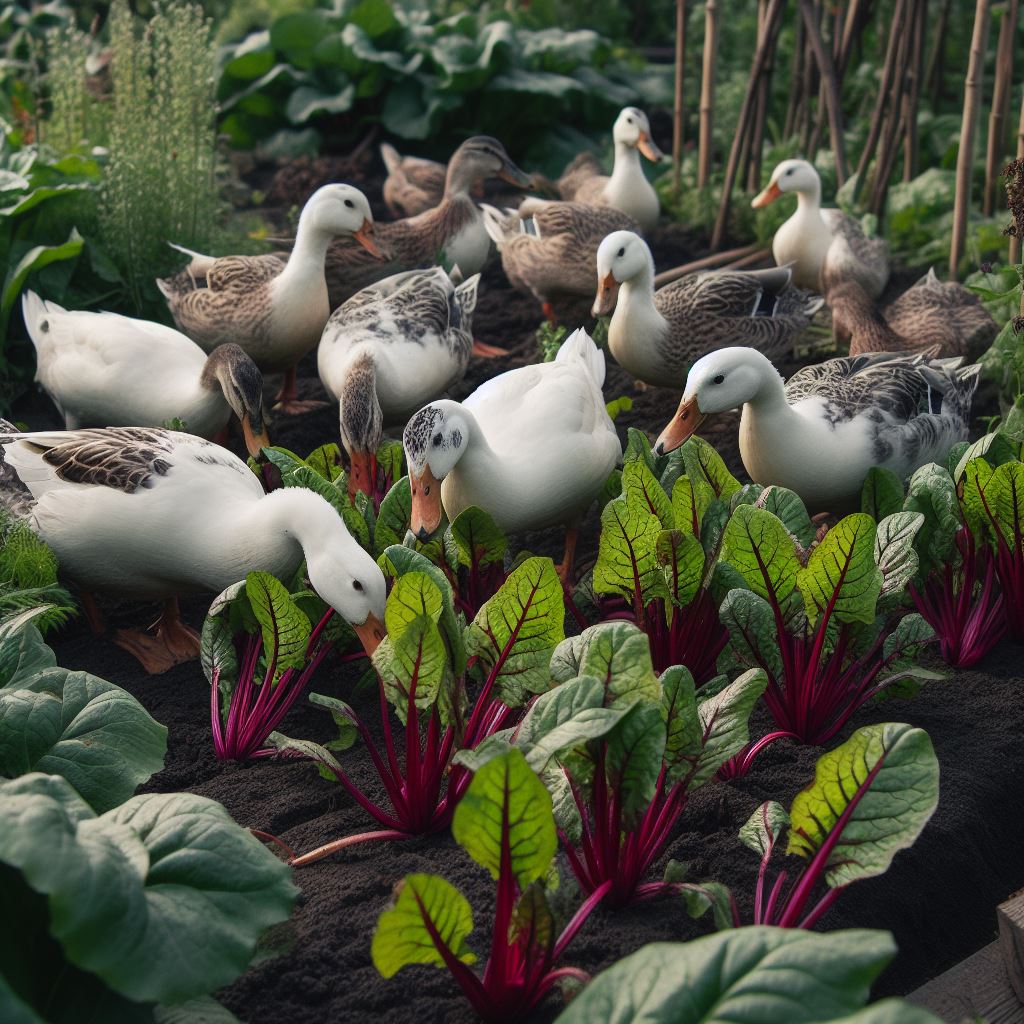Can Ducks Drink Salt Water? Answering Your Query

Table of content:
- What Happens if Domestic Ducks Drink Saltwater?
- Why Do Wild Ducks Drink Salt Water?
- Is It Safe for Baby Ducks to Drink Salt Water?
- Will Freshwater Ducks Die if They Drink Saltwater?
- Can Ducks’ Kidneys Filter Out the Salt from Saltwater?
- How Do Ducks Survive Drinking Saltwater in Winter?
- Is It Normal for Ducks to Drink Ocean Water?
- Do All Species of Ducks Drink Saltwater?
- What Allows Ducks to Drink Saltwater When Other Birds Can’t?
- Final Thoughts
Ducks are amazing creatures. As waterfowl, they spend much of their time in and around water. This allows them to dabble and feed, float and rest, and escape from predators. But not all water is the same. Freshwater and saltwater environments pose different challenges and risks to ducks’ health and survival.
One question that often comes up is whether ducks can safely drink salt water. While most birds cannot tolerate the high salt content of ocean water, ducks have some remarkable adaptations that allow them to drink and thrive in salty environments. In this article, we’ll explore the biology behind ducks and saltwater, look at different species, and examine how ducks are able to consume saltwater safely.
What Happens if Domestic Ducks Drink Saltwater?
Domestic duck breeds that are adapted to live on freshwater would likely suffer from hypernatremia or salt poisoning if they drank high levels of saltwater. Consuming too much salt can lead to dehydration, diarrhea, vomiting, neurological impairment, seizures, and even death.
Domestic ducks do not have the specialized salt glands that wild saltwater ducks use to expel excess salt from their bodies. Without this adaptation, pets like Pekin or Call ducks cannot filter the high sodium levels found in ocean water or even brackish water.
Signs of salt poisoning in domestic ducks can include lethargy, head shaking, unstable walking, excessive thirst, decreased appetite, and reddish-colored urine. If caught early, a duck may recover by slowly administering freshwater. However, the safest approach is to restrict access to any waterbody containing substantial salt.
Overall, while wild ducks are equipped to handle saltwater, domestic breeds have lost these traits through selective breeding. Pet or backyard duck owners should only allow them access to freshwater sources to prevent sodium overconsumption.
Why Do Wild Ducks Drink Salt Water?
For wild ducks living near the ocean, the ability to drink saltwater is crucial for survival. Ducks that inhabit coastal regions, estuaries, wetlands, and shorelines utilize saltwater sources frequently.
Drinking saltwater provides ducks with an easily accessible water source year-round. This allows them to thrive in brackish and marine environments where freshwater is scarce.
Here are some key reasons wild ducks drink saltwater:
- Hydration – Saltwater provides essential hydration and electrolytes to maintain fluid balance.
- Nutrition – Saltwater provides important minerals like sodium, chloride, and iodine that ducks need.
- Habitat range – Drinking saltwater allows ducks to inhabit and exploit coastal areas and marine food sources.
- Winter food access – Saltwater areas give ducks access to food when freshwater is frozen over in colder months.
Common saltwater duck species include Greater Scaup, Ring-necked Duck, Goldeneyes, Bufflehead, Harlequin Duck, Long-tailed Duck, and eiders. These ducks are specifically adapted to thrive in salty, marine conditions.
Is It Safe for Baby Ducks to Drink Salt Water?
For newly hatched ducklings, drinking saltwater can be extremely dangerous. Baby ducks do not yet have the salt tolerance and salt expulsion abilities adult ducks possess.
If a duckling ingests saltwater, it can rapidly lead to dehydration, disruptions in brain function, and death. Ducklings require freshwater in their first few weeks after hatching to avoid sodium overdose.
Some tips to keep baby ducks safe:
- Prevent access to ocean water or brackish sources – only provide pond/lake water or clean bird waterers.
- Avoid offering electrolyte water mixes for ducklings as these have added sodium.
- Monitor any potential diarrhea or lethargy in ducklings, as these are signs of saltwater poisoning.
- Once ducklings are 4-6 weeks old, they may start gaining salt gland functions and can begin transitioning to brackish or marine areas.
With proper freshwater access, attentive monitoring, and slow environmental transitions, ducklings should avoid the dangers of early saltwater ingestion as their salt glands develop.
Will Freshwater Ducks Die if They Drink Saltwater?
Most freshwater ducks have lower salt tolerance than their seafaring cousins. However, drinking limited amounts of saltwater will not necessarily kill them.
Ducks that inhabit freshwater regions like rivers, lakes, and ponds still have functioning salt glands and kidneys to process some salt intake. But these ducks have less efficient sodium expulsion systems compared to coastal duck species.
Consuming higher concentrations of ocean water can exceed the capabilities of freshwater ducks’ kidneys and salt glands. This can lead to hypernatremia, dehydration, and death if they become overloaded with sodium.
Species prone to salt poisoning include mallards, wood ducks, teals, pintails, wigeons, gadwalls, and diving ducks like redheads. These ducks evolved in freshwater regions and are best suited to lower salinity levels.
However, freshwater ducks can still consume some brackish or salty water found in estuaries, wetlands, and coastal areas. Their kidneys can process low to moderate salt levels without life-threatening impacts. So consumption of saltwater depends on the concentrations.
Can Ducks’ Kidneys Filter Out the Salt from Saltwater?
Ducks have extremely effective kidneys that play a key role in filtering out excess salt from their bodies. But ducks rely on another specialized organ called the salt gland to remove the majority of salt from saltwater.
Here’s how a duck’s kidneys and salt glands work together:
- Kidneys – Filter the bloodstream and remove some sodium and fluids as urine. But a duck’s kidneys cannot process the full brunt of ocean water’s salt content.
- Salt glands – Located above the eyes and nostrils, these glands concentrate salt from the blood into a hyper-salty fluid that ducks expel as nasal salt drippings.
Without their salt glands, ducks would rapidly develop toxic levels of sodium in their blood from drinking saltwater. Their kidneys alone couldn’t handle the volumes of salt.
Ducks also conserve water very efficiently via their pee, producing a more concentrated urine output. This reduces fluid loss as they ingest salty water from the ocean.
So in summary, ducks rely on both highly efficient kidneys and specialized salt glands to maintain salt balance while drinking saline water sources. The combination of these systems allows them to thrive where other birds cannot.
How Do Ducks Survive Drinking Saltwater in Winter?
Ducks that live along coasts and oceans use unique adaptations to drink saltwater year-round, even when temperatures drop in winter.
Here are some of the ways sea ducks can ingest saltwater without poisoning when food is scarcer and freshwater is frozen over:
- Increased salt gland function – Colder weather prompts ducks’ salt glands to enlarge and process sodium more efficiently.
- Filter feeding – Ducks dilute ingested salt by taking in seawater along with food like krill or small fish.
- Short stops onshore – Ducks reduce salt buildup by resting on freshwater briefly when possible.
- Kidney adjustment – Kidneys conserve more water in colder months to compensate for salt.
- Feather insulation – Waterproof feathers keep ducks warm in frigid water as they feed.
- Greater fat reserves – Insulating body fat allows ducks to endure chillier marine temperatures.
Thanks to these adaptations, Long-tailed Ducks, Common Eiders, and other cold-hardy species persist on northern coasts year-round without fresh water. They’ve evolved to handle both icy temperatures and salty waters.
Is It Normal for Ducks to Drink Ocean Water?
For the nearly 20 species of ducks that live in marine environments, drinking ocean water is completely normal. They’ve evolved as highly specialized saltwater ducks.
Some examples of ducks where drinking seawater is typical include:
- Common Eider
- King Eider
- Spectacled Eider
- Steller’s Eider
- Long-tailed Duck (Oldsquaw)
- Black Scoter
- Surf Scoter
- White-winged Scoter
- Common Goldeneye
- Barrow’s Goldeneye
- Bufflehead
- Harlequin Duck
These ducks are rarely found far from ocean coastlines and readily drink straight seawater. They possess excellent salt tolerance and efficient salt expulsion abilities that allow them to rehydrate from the ocean.
In contrast, freshwater ducks like mallards, wood ducks, or teals would only drink seawater in emergencies or very dilute forms. For them, saltwater is an abnormal water source lacking in most of their habitats.
Do All Species of Ducks Drink Saltwater?
While many ducks can tolerate some salt intake, only about 20 species are specialized for saline environments. Most ducks inhabit and prefer freshwater habitats.
A few key factors determine which ducks frequently drink saltwater:
- Habitat – Ducks that occupy marine or estuary areas depend on saltwater the most. Inland and freshwater ducks avoid it.
- Salt glands – Well-developed supraorbital salt glands above the eyes indicate adaptation to saltwater.
- Kidney function – Excellent water conservation helps concentrate salty fluids.
- Feeding – Filter feeders dilute salt by consuming marine foods as they drink.
- Feathers – Diving sea ducks have waterproof feathers that retain warmth while swimming in frigid, salty waters.
- Beak shape – Strainer-like beaks filter saltwater during feeding in some sea ducks.
Mallards, wood ducks, teals, whistling ducks, and other freshwater species lack many of these adaptations. So while they may ingest some brackish water, regular ocean water consumption is quite harmful for these ducks not evolutionarily adapted to saline waters.
What Allows Ducks to Drink Saltwater When Other Birds Can’t?
Ducks possess several unique evolutionary adaptations that set them apart from other birds and allow them to thrive where saltwater kills other avian species:
- Supraorbital salt glands – Located above the eyes, these glands concentrate salt from blood and excrete it as a fluid.
- Nostril salt excretion – Ducks have special glands that allow them to expel concentrated salt through their nostrils.
- Efficient kidney function – Ducks’ kidneys conserve water by excreting small amounts of concentrated urine waste.
- Feather waterproofing – Oils coat their feathers allowing ducks to float on water without soaking and chilling.
- Heat conservation – Insulating down feathers and fat helps ducks retain warmth in icy salt water.
- Beak strainers – Some ducks have beak shapes optimized for filter feeding in seawater.
- Salt appetite – Ducks instinctively seek out salty foods and water to fulfill nutritional needs.
- Salt tolerance – Over time, sea ducks evolved mechanisms allowing them to tolerate extremely salty ocean conditions.
Thanks to this suite of adaptations, ducks can exploit marine environments that limit other avian families like gulls, terns, waders, and songbirds. Their unique biology allows them to swim, feed, drink, and thrive in salty waters.
Final Thoughts
Clearly, not all ducks have an equal relationship with saltwater. While most dabbling ducks limit their salt exposure, roughly 20 species have evolved as specialized sea ducks.
Unique adaptations like the supraorbital salt gland, efficient kidneys, waterproof feathers, and more allow certain ducks to drink straight ocean water with no issue. For them, it’s a perfectly normal and essential water source.
Yet for domestic ducks and their wild freshwater cousins, drinking high volumes of saltwater remains dangerous and something they have limited tolerance for. Understanding the varied duck species and their saline drinking abilities provides key insights into duck biology, behavior, and their amazing ability to prosper in diverse aquatic environments.
Welcome. I’m Adreena Shanum, the proud owner of this website, and I am incredibly passionate about animals, especially poultry. I founded adreenapets.com as a labor of love, stemming from my desire to share my knowledge and experiences with poultry enthusiasts worldwide.




